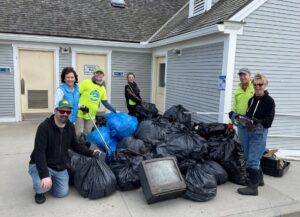 HYANNIS – Along with the warm temperatures, sunny days and summer guests comes more laundry – and some unseen visitors. Bacteria proliferate in bath towels, beach towels and kitchen towels in the warm, humid weather.
HYANNIS – Along with the warm temperatures, sunny days and summer guests comes more laundry – and some unseen visitors. Bacteria proliferate in bath towels, beach towels and kitchen towels in the warm, humid weather.
A headline in a recent House Beautiful article warned “So bad news. You’re not washing your towels enough and they’re filled with bacteria.”
Is this something we should really be concerned about?
Not really, said Kathleen Kohut, MS, RN, CIC, director of infection prevention for Cape Cod Healthcare.
“As long as you don’t share your towels with others, it’s not a big deal because they are your own ‘bugs,’ organisms/bacteria,” she said.
The other important tip is to make sure towels dry completely between uses to prevent the growth of mold.
There is more of a concern when using kitchen towels, however.
“The thing with kitchen towels is multiple people use them so now you have an opportunity for cross-contamination,” said Kohut. “The other problem is people also use them for food prep and clean-up.”
If kitchen hand towels were used just to dry your hands, that wouldn’t be an issue. If they are used to clean up chicken juices or other food that may be harboring bacteria, then it can be transmitted to you when you use the towel to dry your hands, she said.
She outlined the good-to-best scenarios of how to prevent bacteria or other micro-organisms from spreading in the kitchen.
Good: use paper towels to clean up spills and juices from meats and other foods.
Better: only use the kitchen towel to dry your hands.
Best: only use paper towels and never use hand towels.
If you prefer to use hand towels in the kitchen, change them every day.
When it comes to laundering towels in general, there are many theories and suggestions behind the ideal way to wash them, but there isn’t really any substantial research on how often you should wash your towels, said Kohut.
She recommends the following as a rule of thumb:
Wash your towels if they’re damp, have a bit of an odor or are visibly dirty.
Wash them at least once a week, if they dry completely between uses, or every couple of days if they don’t.
The best way to wash them is using hot water and bleach. If you don’t want to use bleach, you can use warm water with a color-safe chlorine bleach.
“I think the water, agitation, spinning, and rinsing accommodates getting rid of the bacteria as well,” said Kohut. “It’s really the same process as washing your hands. The germs become slippery from the soap and with the agitation from rubbing your hands together, they are rinsed off with the water.”
By ROBERTA CANNON, Cape Cod Health News























